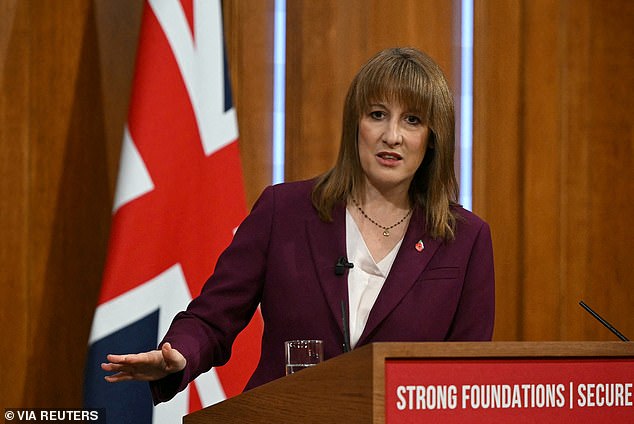Workers, pensioners and landlords are bracing themselves for swingeing tax increases as Chancellor Rachel Reeves plans what is expected to be a radical Budget on November 26.
She is said to be focusing on big changes to some top money-raisers for the Treasury – income tax and National Insurance – despite promising to leave them alone.
Several options are thought to be on the table.
Ms Reeves could raise income tax by 1p or 2p, or she could raise income tax by 2p and cut National Insurance by 2p – which would result in most taxpayers seeing no change to their take-home pay, although some would still face a cut.
She could also restrict the use of salary sacrifice.
Here’s what each scenario could mean for you.

Stealth tax: More people than ever pay higher-rate tax of 40% on pay of £50,271 to £125,140 as income tax bands have been frozen until 2028
Basic-rate taxpayers
Those earning £12,570 to £50,270 are taxed at 20 per cent on income above their personal allowance of £12,571, and pay National Insurance (NI) at 8 per cent. Putting 2p on income tax could cut take-home pay by hundreds of pounds.
Someone on £25,000 a year pays £2,486 in income tax and £994 in NI, but this would rise by £249 a year, according to financial adviser Quilter, which has analysed the potential impact of rumoured tax rises on households.
A worker earning just shy of the higher-rate tax at £50,000 a year, who pays £7,486 in income tax and £2,994 in NI, would pay £749 extra under an income tax rise.
If the Chancellor also cuts NI by the same amount, basic-rate taxpayers would see no change to their take-home pay.
Shaun Moore, Quilter’s tax and planning expert, thinks a straight income tax rise would be the simpler option, but the Government had pledged not to put it up.
An income tax rise and a NI cut may be more pragmatic, he says, adding: ‘It allows the Chancellor to raise significant revenue while protecting the majority of working households and maintaining the sense that manifesto commitments are being “bent” rather than broken.’
Basic-rate taxpayers are also likely to avoid the worst impact of a crackdown on salary-sacrifice schemes, where employers let staff take a supposed ‘pay cut’, with the difference ploughed into their pensions or put towards benefits such as childcare. Both sides pay less NI as a result.
Ms Reeves is reportedly looking at a £2,000 cap on how much staff pay into pensions using salary sacrifice without having to pay National Insurance.
Workers who exceeded the cap would have to stump up more to end up with the same amount in their pensions.
So someone on £50,000 sacrificing 5 per cent, or £2,500, of their pay must put £40 more into their pension, while their employer would have to contribute £75.
If they sacrificed 8 per cent of salary, or £4,000 a year, they would be £160 worse off and their employer would be £300 out of pocket.
So with the extra in income tax plus salary sacrifice, a worker would pay just over £900 more.
Higher-rate taxpayers
More people than ever pay higher-rate tax of 40 per cent on pay of £50,271 to £125,140 as income tax bands have been frozen until 2028.
Anyone on £100,000 to £125,140 also has their personal allowance gradually removed by £1 for every £2 of extra income, creating a trap in which you pay 60 per cent tax on earnings.
If you earn £75,000 you stump up £17,432 in income tax and £3,511 in NI. If income tax goes up by 2p, your income tax bill would be bumped up by £1,249 a year.
If NI is cut by the same amount, your tax bill would not change.
However, Ms Reeves is thought to be considering cutting NI by 2p at the basic rate only.
So if you earn £75,000 your income tax bill would increase by £1,249 but your NI would only reduce by £754 on earnings that attract basic-rate tax – leaving you with a total additional tax bill of £495 a year.
Those on £100,000 pay £27,432 in income tax and £4,011 in NI. Under a 2p income tax rise, you would pay a further £1,749. With NI cut at the basic rate only, you would pay a total of £995 in extra tax.
Now let’s examine the effect of a £2,000 salary-sacrifice cap on higher earners.
Someone on £75,000 sacrificing 5 per cent of salary would have to pay an extra £35 in NI into their pot and their employer would pay £263 to get the same amount into their pension if a cap is imposed.

Tax assault: Chancellor Rachel Reeves is said to be looking at both income tax and National Insurance – despite promising to leave them alone
Someone sacrificing 8 per cent of their salary would have to pay in an extra £80 and their employer £600.
The more you earn and put in your pension, the greater the hit if salary sacrifice is curbed.
If you earn £100,000 and sacrifice 5 per cent of your income for your pension, you would have to pay in an extra £60 yourself if a cap is imposed, but your employer must put in £450.
If you sacrifice 8 per cent of your salary you would have to pay in an extra £120 if a cap is imposed and your employer £900. So with additional income tax and salary sacrifice, such workers face paying £1,869 more.
David Brooks, of the financial services consultancy Broadstone, says capping salary sacrifice would hit pension saving, adding: ‘People will feel poorer and many will reduce their contributions.’
Additional-rate taxpayers
Staff earning more than £125,140 face 45 per cent income tax. Those on £150,000, pay £53,703 in income tax and £5,011 in NI.
But if Ms Reeves increases income tax by 2p, you will pay an extra £3,000 a year in tax. If NI is cut by 2p but only for income earned at the basic rate, you will pay a total of £2,246 extra tax.
If salary sacrifice is capped, you must pay an extra £110 in NI and your employer will pay £825 more if you sacrifice 5 per cent of your salary.
If you sacrifice 8 per cent, you will have to pay an additional £200 and your employer £1,500.
Pensioners
At 66 you don’t pay any further National Insurance.
The state pension is around £12,000 at the full rate, rising to just over £12,500 in April, so if you earn even a small private pension or taxable income, you breach the £12,570 personal allowance and must pay income tax.
A 2p increase will hit pensioners hard.
If NI is cut and income tax goes up, pensioners will not benefit as they don’t pay NI anyway, leaving them among the biggest losers.
Landlords
NI isn’t payable on rental income, but this anomaly could be in Ms Reeves’s sights. Employees pay 8 per cent NI on basic rate earnings and 2 per cent on anything over.
A landlord on basic-rate tax and earning £10,000 in rental profit would see their annual bill rise from £2,000 to £2,800 if they pay NI.
The annual bill for one on higher-rate tax would rise from £4,000 to £4,200.
